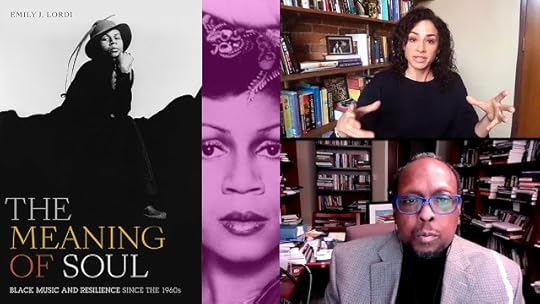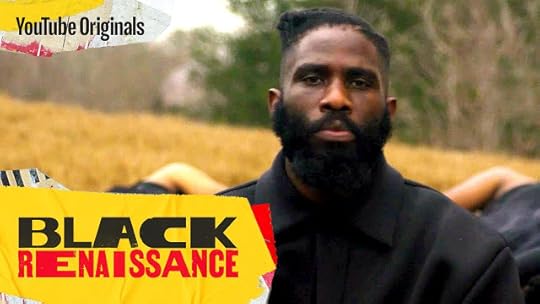Mark Anthony Neal's Blog, page 243
March 1, 2021
A New Label for Music by Black Composers

"Pianist Lara Downes recently launched Rising Sun Music, a digital label that will release new recordings of music by Black composers from the last 200 years. The first release is titled Remember Me To Harlem and features the work of William Grant Still, Benny Golson, Eubie Blake, and Maragret Bonds. Downes joins All Of It to discuss the project."
In The Story Of U.S. Immigration, Black Immigrants Are Often Left Out

"Nana Gyamfi, Executive Director of the Black Alliance for Just Immigration, tells Weekend Edition Saturday's Scott Simon about challenges Black immigrants to the U.S. face."
February 27, 2021
Black Renaissance: Tobe Nwigwe | "The Revolution Will Not Be Televised"
Off-Color and On Point: Richard Pryor's ‘Craps (After Hours)’ by Scott Saul
 This essay is adapted from the liner notes written for Omnivore's reissue of Craps (After Hours).
This essay is adapted from the liner notes written for Omnivore's reissue of Craps (After Hours).
Off-Color and On Point: Richard Pryor's ‘Craps (After Hours)’
by Scott Saul | @scottsaul4 | special to NewBlackMan (in Exile)
The album ‘Craps’ (After Hours) was born out of a moment of high desperation for comedian Richard Pryor — a moment when a whole mess of bills, financial and psychological, crashed due on him. And ‘Craps’ is a messy masterpiece, its 32 tracks awkwardly edited and sequenced, with some as short as eleven or twelve seconds. It’s hard to hold the whole of the album in your head, even as it’s easy to let it play and laugh with it. The feel of the album is casual and loose, even as it insistently touches on the anti-Black violence that has been at the core of American history and that Pryor experienced himself. How this happened — how Pryor took the chaos of his life and times, then spun it into an act that dwelled in chaos, artfully and messily at once — is the best kind of mystery: the kind that only becomes more fascinating as we try to unravel it.
***
When, on December 9, 1970, Richard Pryor chose to sign a Laff Records contract that dictated some extraordinarily difficult terms, his personal life was in shambles. His stepmother and father had died over the past three years, and his mother had been hospitalized with the cancer that would claim her life. His wife Shelley had recently filed for divorce, becoming the third woman to take him to court in the past two years, with the two others suing him separately for child support. He was hooked on cocaine and in serious arrears with his drug dealer. As David Drozen, the younger part of the father-son team behind Laff Records recalled, “When we signed Richard Pryor, we gave him an advance of five thousand dollars. He said he had to have it or otherwise he was going to get killed. He said, ‘if I don’t get this I’m going to die.’”
Professionally, Pryor was in free fall too. After his first album had been released on a Reprise Records imprint and generated less income than he anticipated, Pryor had asked to meet with his manager Bobby Roberts (who, as a Reprise Records exec, did have a notable conflict of interest with his client). Pryor wanted to know why, despite the two-album $50,000 contract he’d signed, he was receiving so little from the label. The meeting, held in his agent Sandy Gallin’s office, ended with Pryor pistol-whipping Roberts — and with his Reprise contract voided. He was also, naturally, out a manager.
Gallin stepped in by swinging Pryor some odd jobs on TV — for instance, a guest role on The Partridge Family in an episode about the Partridge family being mistakenly booked at a struggling soul music club in Detroit. (Naturally, the episode ended with the white musical family saving this Black community institution. Wasn’t that what white Americans wanted to believe about themselves — that they’d saved the Black community from itself, time and again?) But Gallin had a full plate as an agent, and for the next two years, Pryor effectively had no one except himself to manage his career.
Pryor’s national club dates also started drying up at this time, in no small part because he was turning more to Black life in his act and refusing to do a separate “clean” act at the larger venues. Even the club dates that he played, if they drew a racially mixed audience, were spring-loaded with tension, with the white members unsettled by his new material and all the “bitches,” “motherfuckers,” and n-words whizzing in their direction. “The deeper you get,” Pryor said, “the more uptight they get. It scares them.”
This, for Pryor, was his intention; he did not want to entertain as he’d done in the past. “When I go on stage,” he told Muhammad Speaks in a revealing 1969 interview, “I do certain things, then watch them go through their changes; squirm like worms. I guess I’m a bit sadistic. Then I watch their faces. After I figure out who’s who, I see that some of them are sick. I work on the sick ones first.” A critic for the Oakland Tribune judged that Pryor “had an act the like of which has never, to my knowledge, been done before in a conventional nightclub.”
The saving grace of this moment for Pryor, artistically, was that, for the first time since his earliest days as a comic in Peoria, he was also starting regularly to perform at nightclubs that drew an almost entirely Black audience. At Maverick’s Flat and the Redd Foxx Club, and with his comedy compañero Paul Mooney encouraging him all the way, he was experiencing an extraordinary sense of creative freedom. In these lively Black Angeleno clubs, he could say anything, any words, he wanted, and those parts of himself that had been buried, by shame or censorship, could now serve as his creative fuel. He could talk about the sometimes liberating, sometimes harsh carnival of his life — the sex and drugs, the jealous rages, the whorehouses and after-hours joints, the experiences with police lineups and prison strip-searches — and put it all up for inspection.
Here’s where the partnership between Pryor and Laff Records made sense: they were both trying to make the most out of breaking taboos. Laff had, since 1966, been signing Black comedians who played the York Club, at Florence and Western in South Central LA, and the label reveled in raunch. ‘Craps’ (After Hours) would follownaturally in the line of Laff albums with titles like Elsie’s Sporting House, Mutha Is Half a Word, Two or Three Times a Day, and That Ain’t My Finger.
The sticking point, later, would be the terms of the partnership between the two. In signing the contract, Pryor agreed to some stiff conditions: he gave Laff exclusive rights to his comedy for two years, during which time he would produce four albums, and he gave Laff the option for two more years, during which time Laff would release a minimum of three more records of his. After generating one comedy record in his first thirty years, now Pryor was on the hook to churn out at least seven albums in the next four. And he would do all this for $5,000 for the first album, and $27,500 for the next three. Pryor, one imagines, was focused on his present emergency, and on the bare fact that Laff appeared to be offering him a lifeline when no one else would.
***
It’s instructive to compare the great “after hours” sketches on ‘Craps’ — “After Hours,” “280 Pound Ass,” and “Crap Game” — with “Hank’s Place,” a clear antecedent recorded two years earlier. On “Hank’s Place” (included with Omnivore’s reissue of Richard Pryor but not released at the time), Pryor dramatizes what it was like to be a wide-eyed, fifteen-year-old in the very adult world of Hank’s Place, surrounded by characters who dazzle him with their drama. “After Hours” on ‘Craps’ starts with a completely different premise: here Richard is banging on the door of the same Hank’s Place, and when the doorman keeps him on the outside, he yells back, “What the fuck wrong with you? You gonna slam the door in my face, as much money as I spent in this raggedy motherfucker?!” When that fails to work, this Richard ups the ante by starting to play the dozens with the doorman — “I knew your mama when she was whorin’!” — and the door opens, and the sketch begins in earnest.
“Hank’s Place” and “After Hours” give us two very different Richards. The earlier Richard was happy hanging in corners, shielding himself from scrutiny. The new one was ready to barge his way, physically and verbally, into the center of the action. He’s an adult in an adults-only world, someone who’d be at home at Hank’s Place — or the Redd Foxx Club, for that matter.
On ‘Craps’, Pryor’s tone became more aggressive, his jabs more direct. On most tracks he dialed back his child-like vulnerability, which had been so central to his earlier stage persona, and was willing to own up boldly to adult desires, confusions, and lunacies, even though that meant sacrificing the winsomeness that had endeared him to his previous audiences. On “Religion,” he imagined shitting in the collection plate (and later, in a classic line, repelling Dracula with a cross “because he’s allergic to bullshit”). On “Jackin’ Off,”he testified about “jack[ing] off so much I knew pussy couldn’t be as good as my hand.” The opening set of tracks — “Gettin’ High,” “F**k From Memory,” “Big Tits,” and “Getting’ Some” — were the first time that he had scrutinized his own marital life on record, and they sketched a marriage born under a bad sign. Pryor showed himself tapping into the freedoms of the counterculture, the copious drugs and the “free love” orgies, and discovering that, rather than elevating him to Nirvana, they were only making him more paranoid and more jealously possessive — more impossible. He was skeptical of woolly ideas about love, even when it came to the question of how much his own comedy could break down racial barriers in his audience:
It’s great. We think that we can all sit in the same club, white and black — and not understand each other.
[newscaster voice] It’s amazing. It could only happen in America.
(“The Line-Up”)
‘Craps’ also pulled together a number of routines that dramatized how, to be Black in America, was to live under police occupation. Pryor had been performing some of these routines since 1966, but once collected here, they effectively charted a decade in the life of a young Black man, growing up in the pincers of the law. The givens of the situation were harsh — the police treated you like you had a target on your back and humiliated you as a matter of course — but Pryor revealed the absurdities that played out alongside the injustice. As a young teenager, for instance, he knew to fear the Black cop enforcing the curfew more than the white one: “The black cop had to do more shit to keep his job. He had to whup more niggers than the white cop. ‘I ain’t gonna lose my pension, nigger!’” (“I Spy Cops”) Policemen would track you down, treat you like a criminal, and make demands that were impossible to comply with:
“Shut up, punk! Put your hands against the wall!”
“There ain’t no wall!”
“Find one!” (“The Line-Up”)
The rituals of prison, like the rituals of law enforcement, looked just as perverse on further inspection. “You talk about degrade a nigger,” Pryor said, about being strip-searched in a California jail. “They degrade you immediately. I don’t know what they be looking for. What you be looking for in my ass? Ain’t nothing in my ass. If I had a pussy, I might dig it because you can hide something in your pussy. But in your ass—what am I going to hide in my ass? A pistol?” (“Ass Wupin’”).
What was a young Black man to do? One answer was to treat these moments of degradation, under the eye of the law, as opportunities to push back somehow. The Black characters on ‘Craps’ do not simply submit to authority. Pryor gets at this resistance, in “The Line-Up,” when he recalls how those dragged into police line-ups, as suspects, acted like they were “in show business,” each performing their preferred version of themselves. He evokes a spirit of defiance even more powerfully at the end of “Crap Game,” when a black cop and a white cop raid the game and ask for the whereabouts of a certain Jesse. The question gets deflected first by Raymond, who swears to God that he was blind up “until I seen you [the police] walk through the door.” The white police officer steps in to butter up Cooper, another denizen of Hank’s: “We need your cooperation and we’re trying our gosh-darnedest to help you people down here. Now how about chipping in? What do you say?” To which Cooper responds, “Fuck you, hunky.”
The cop says, lamely, “I don’t understand your people” — but it’s fair to say that the members of Pryor’s live audience didn’t share the incomprehension. They knew why, given the tilted scales of the American criminal justice system, Black people were loath to finger one of their own.
Another way of describing ‘Craps’ — with its riffs on sex that would have been at home on Laff’s other “party records”; with its close-up appreciation of the Black underworld; with its instinctive animosity to the power of the police; with its frequent use of “motherfucker” and the n-word — is that it was both proudly Black and proudly working-class. Bill Cosby, despite his roots in the Black working-class, had always conveyed an aspiration to respectability. Pryor, on ‘Craps’, was shameless, and in this early-1970s moment, when the boundaries around obscenity were dissolving, that was a source of great power. Anything could become material for him as an artist; anything could be put on wax.
***
The four extra tracks included in Omnivore’s reissue of ‘Craps’ suggest where Pryor went, geographically and artistically, after ‘Craps’. Geographically, he headed to the Bay Area, pushed by his sense, after the great Northridge earthquake of February 1971, that he was doomed in LA. “It was as if I was stuck to a funnel cloud that was tearing a path of destruction everywhere I went,” he remembered. “I sensed catastrophe around the corner and knew I had to get out.” Once settled in Berkeley, he opened up some distance between himself and the entertainment industry, befriended free-thinking Black radicals like the writers Ishmael Reed, Cecil Brown, and Claude Brown, and found audiences that were open to performances that were both more political and more exploratory. Two tracks on the reissue — “Whorehouse, Pt. I” and “Wino & Junkie” (Alternate Version) — were recorded at a “People’s Festival” held at Oakland’s Laney College, where Pryor shared billing with The Lumpen, a soul band that was the official musical group of the Black Panther Party, and Teatro Campesino, the experimental theater company formed to agitate for the welfare of farmworkers.
In his seven-month sojourn in the Bay Area, Pryor went to places that he’d only begun to explore on ‘Craps’ — places where it was hard to find any laughter that wasn’t complicated. In “Whorehouse Pt. I” and “Whorehouse Pt. 2,” he delved into how his childhood, growing up in and around brothels, shaped him. He turned the story of a white john, asking for sex from his mother, into an explosive joke about the expectation that Black people should not judge White people for how they’d acted: “I could have grown up to be ignorant, and prejudiced. Not me, boy. No, I learned for myself what people are like. ‘Cause I met some nice white dude. They used to come down [and say], “Hello, little boy, is your mother home? I’d like a blow job.”
Pryor’s “Wino & Junkie” sketch became his showstopper for years to come, and in this early version of it we can hear why San Francisco Chronicle critic Phil Elwood judged it “an exquisitely turned bit of pure theater.” What starts as a ragged dialogue between two down-and-outers turns, unexpectedly, into a tender father-son drama. The two men are revealed to be the perfect odd couple: one old, one young; one drawn to the past, one thinking of his future; one full of swagger, one drained of self-confidence. When they collide on the street, they complete each other and hold each other up. It was another example of a moral lesson that you could take from ‘Craps’: that Black people with the least social power still had resources — resources of inner faith and imagination, resources activated by reaching out to others — that could sustain them even in dark times.
* * *
Pryor’s partnership with the Drozens at Laff Records frayed not long after ‘Craps’ was released in March 1971. In a small capsule review, Billboard appreciated how this “sex laugher” brought “humor to subjects that people find difficult to laugh at,” but the album made a relatively small ripple at the time of its release, becoming a prized possession among the Black customers who supported other Laff artists but not breaking out of the “party record” genre. Pryor’s Bay Area sojourn, spent in the company of successful Black writers and intellectuals, convinced him that he should turn his talents to screenwriting and acting, rather than stand-up, and he never recorded even the second of the four albums he’d promised to fulfill his Laff Records contract.
After 1972, the story of the relationship between Pryor and Laff Records is largely one of litigation. When Pryor signed a contract with Partee, a subdivision of Stax Records, for That Nigger’s Crazy (1974), Laff sued — and the terms of settlement allowed Pryor to record for another label as long as Laff was allowed to release previously unissued Pryor material from 1966 to 1968. In 1975, Pryor sued Laff for repackaging already released material without his consent, but Laff continued to release Pryor albums, year after year, often timed and titled to cash in on Pryor’s latest box-office hit. Thus Pryor’s role in The Wiz brought Laff’s The Wizard of Comedy; Pryor’s role in Stir Crazy brought Laff’s Insane; Pryor’s role in Superman III brought Laff’s Supernigger; and so on. In all, Laff released sixteen Richard Pryor records between 1971 and 1983, most of them full of Pryor’s 1960s material but plugged as if they were fully of the moment. (By comparison, Warner Bros., Pryor’s main label, released seven over the same interval.) Pryor was vexed, but it was only in 2002 that, through the efforts of his wife and manager Jennifer Lee Pryor, he won back the legal rights to all the Laff material.
And yet: while the misalliance between Pryor and Laff produced much sorrow, there is no denying the explosive charge of ‘Craps’. It was the one true issue of their relationship: off-color and on point. Crudely conceived and edited, it was also crudely powerful. The Drozens gave Pryor the free rein that he’d been longing for, and he made sure not to waste it.
***
SCOTT SAUL is a historian and critic who has written for The New York Times, Harper's Magazine, The Nation, Bookforum, and other publications. The author of Becoming Richard Pryor and Freedom Is, Freedom Ain't: Jazz and the Making of the Sixties, he is also the creator of Richard Pryor's Peoria, an extensive digital companion to his biography of the comedian. He teaches courses in American literature and history at UC-Berkeley, where he is a Professor of English. He lives in Berkeley, California, with his wife and son.
February 26, 2021
The Genius of Fela Kuti and Afrobeat (feat. Femi & Made Kuti)

"Fela Kuti has inspired musicians from all over the world from Burna Boy and Beyoncé, to Miles Davis. Sound Field dives into the musical genius of Fela's cultural funk. Sound Field host LA Buckner speaks to Fela's son and grandson, Femi and Made Kuti about carrying on the legacy of Afrobeat."
Book Talk with Catherine Coleman Flowers | "Waste: One Woman’s Fight Against America’s Dirty Secret"

"MacArthur “genius” Catherine Coleman Flowers grew up in Lowndes County, Alabama, a place that’s been called “Bloody Lowndes” because of its violent, racist history. Once the epicenter of the voting rights struggle, today it’s Ground Zero for a new movement that is Flowers’s life’s work. It’s a fight to ensure human dignity through a right most Americans take for granted: basic sanitation. Too many people, especially the rural poor, lack an affordable means of disposing cleanly of the waste from their toilets, and, as a consequence, live amid filth. Flowers calls this America’s dirty secret. In Waste: One Woman’s Fight Against America’s Dirty Secret, Flowers tells the story of systemic class, racial, and geographic prejudice that foster Third World conditions, not just in Alabama, but across America, in Appalachia, Central California, coastal Florida, Alaska, the urban Midwest, and on Native American reservations in the West." -- Duke Franklin Humanities Institute
Left of Black S11 · E16 | The Meaning of Soul with Dr. Emily J. Lordi

Soul music–– say it and it has different meanings to different people. It originated from within the African American community leading up to and during the Civil Rights Era. So, was the music of such icons as Aretha Franklin, Isaac Hayes, Donny Hathaway, Minnie Ripperton, and many others not only meant as entertainment but also a form of Black resistance? What deeper social meanings can we mine from the expansive library of soul music from the 1960’s onward and how has this genre evolved to still influence artists today? On this episode of Left of Black, host Mark Anthony Neal is joined by Professor Emily J. Lordi of Vanderbilt University as they discuss her latest book, The Meaning of Soul: Black Music and Resilience Since the 1960’s, published by Duke University Press.
February 25, 2021
A Wide-Ranging Exploration of Alice Walker and 'The Color Purple'

"Salamishah Tillet, a contributing critic-at-large for The New York Times and the Henry Rutgers professor of African American studies and creative writing at Rutgers University, Newark, joins us to discuss her new book, In Search of The Color Purple: The Story of an American Masterpiece . The book explores Alice Walker’s seminal novel and its cultural impact through archival research and interviews with Walker herself, as well as other public figures, including Oprah Winfrey and Quincy Jones."
Rooting Out Extremism In The Police

"The insurrection at the U.S. Capitol shocked the nation. A recent NPR analysis found that 20 percent of those charged in the insurrection at the Capitol riot appeared to be current or former service members. But the military isn't alone. At least 30 police officers attended the rally before the insurrection. And a retired New York police officer was just charged with assaulting a Washington, D.C. police officer during the insurrection. Why have white supremacy and far-right extremism infiltrated the ranks? How can the police tackle the problem?Michael German, Vida Johnson and Houston Police Chief Art Acevedo talked with 1A about it."
"How Can America Not Know This Story?": Lee Daniels on the Enduring Relevance of Billie Holiday

"Director Lee Daniels returns with his first film in eight years. The United States vs. Billie Holiday is a biopic that delves into the legendary singer’s life, focusing on efforts by the federal government to target Holiday over her civil rights activism. Daniel's film also explores how controversial Holiday's song "Strange Fruit" was at the time, for shining a light on the lynchings of Black Americans by white Southerners. Speaking with The Takeaway, Daniels said that he was unfamiliar with some of the specifics of Holiday's life before working on the project, and after the first reading, the film's script wondered, "how can America not know this story? And if America doesn’t know this story, how many other stories are out there that we don’t know?"
Mark Anthony Neal's Blog
- Mark Anthony Neal's profile
- 30 followers




